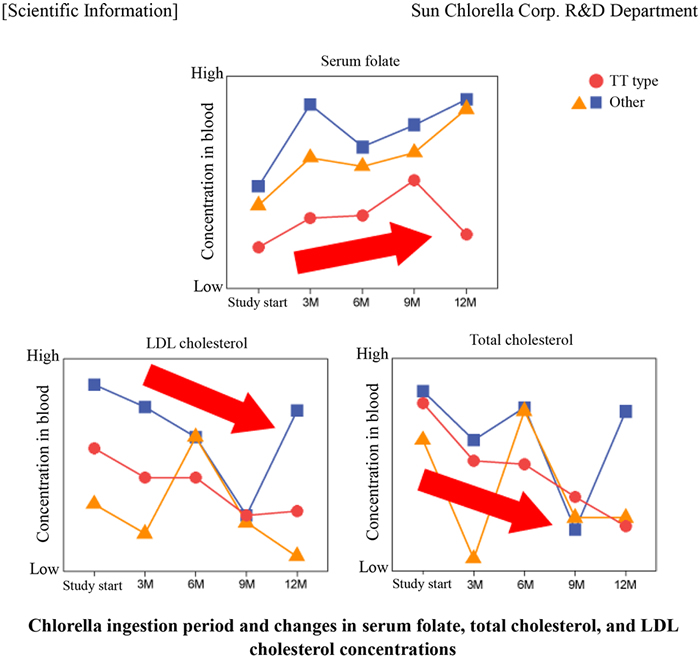- TOP
- List of reports
- Relationship of folic acid utilization from Chlorella ingestion with lipid metabolism
Relationship of folic acid utilization from Chlorella ingestion with lipid metabolism
【Scientific information】
Research and Development Department, Sun Chlorella Corporation
Relationship of folic acid utilization from Chlorella ingestion with lipid metabolism
Presented at the Joint Meeting of Asian Congress of Nutrition 2015 and the 69th
Annual Meeting of Japan Society of Nutrition & Food science
- Study Objectives
- Deficiency of folate not only increases the risk of cardiovascular diseases and spina bifida
onset in babies but also increases the disturbances in lipid metabolism. The absorption rate of
folate contained in foods is low compared with that of folic acid synthesized as a supplement.
We reported at the 53rd Annual Meeting of the Kinki Branch of Japan Society of Nutrition &
Food science that Chlorella ingestion increased serum folate and vitamin B12 levels, etc. in the
blood and reduced homocysteine levels in subjects who had a genotype associated with poor
folic acid utilization efficiency.
This time at the meeting named in the caption, we described how Chlorella ingestion influenced the lipid metabolism of subjects with the TT-type MTHFR gene who showed poor folic acid utilization efficiency and described a comprehensive microarray analysis of gene expression We report the results in the following sections.
- Study method
- Three healthy adult males participated in this study as subjects. They were asked to take 4 g of Chlorella twice a day in the morning and evening every day for 1 year. Their MTHFR gene was examined, and serum folate, lipid metabolism indices, etc. in the blood were investigated every 3 months.
- Results
- As a result of Chlorella ingestion, serum folate and vitamin B12 levels increased, while total cholesterol and LDL cholesterol levels continuously decreased of subjects with the genotype of poor folic acid utilization efficiency. In addition, the microarray analysis indicated that the expression of the CUBN gene associated with the in vivo transport of vitamin B12 and of the gene associated with the antioxidant action were substantially enhanced. Furthermore, the expression of the gene involved in neuropathic pain decreased in all the subjects.
- We conclude that the long-term ingestion of Chlorella is beneficial even for subjects with the TT-type MTHFR gene who show poor folic acid utilization efficiency.

Terminology
- *Genotype of poor folic acid utilization efficiency
- The genotype in question is called MTHFR. Approximately 16.7% of Japanese carry the TT type of this genotype and show poor folic acid utilization efficiency.
Details
- Academic society:
- The Joint Meeting of Asian Congress of Nutrition 2015 and the 69th Annual Meeting of Japan Society of Nutrition & Food science
- Title:
- Relationship between long-term chlorella consumption and lipid metabolism in male adults: global gene expression analysis and findings from MTHFRC677T
- Authors:
- Masaki Fujishima1), Masato Onishi1), Michie Kobayashi2), Seiji Nakamura2),Hideo Takekoshi1)
- Affiliation:
- 1) SUN CHLORELLA CORPORATION, 2) DNA Chip Research Inc





